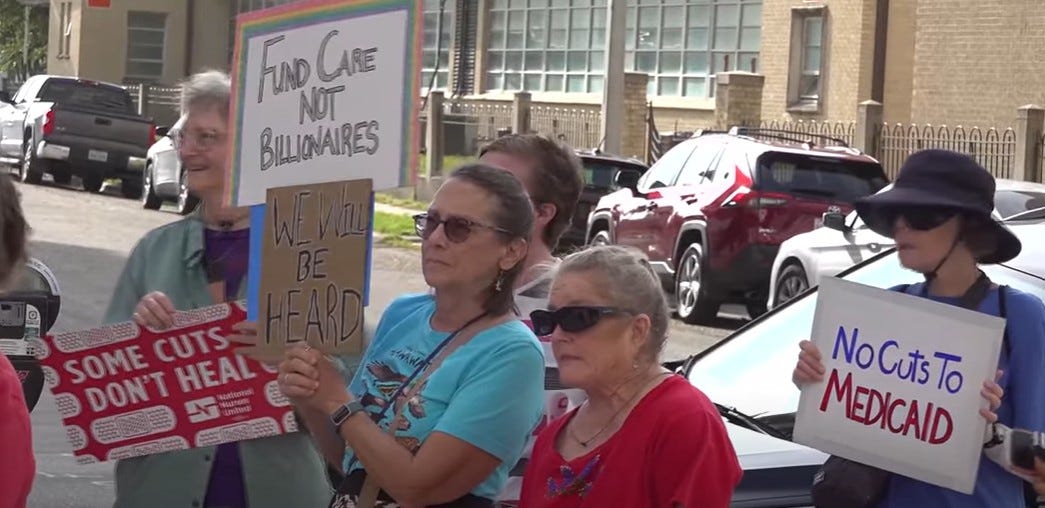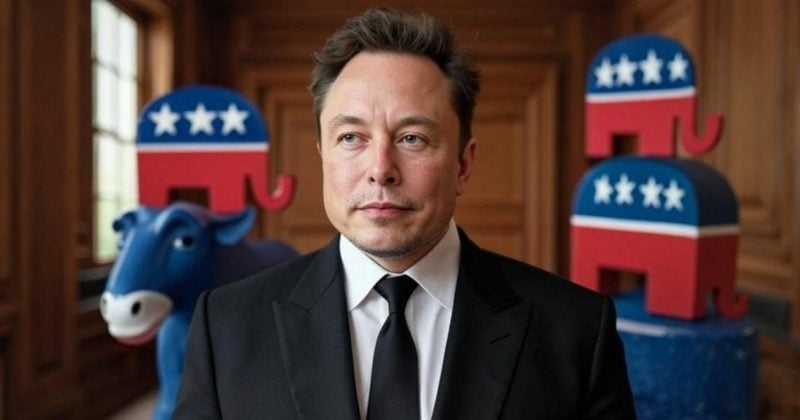Justices from both political parties appeared bewildered during oral arguments in National Pork Producers Council v. Ross, a case the Supreme Court heard on Tuesday which asks whether California is permitted to enact an animal cruelty law that, at least according to many of the nation’s pork farmers, could fundamentally change how pork is produced in all 50 states.
The immediate stakes in Pork Producers are whether a California law, that could lead to more humane farming conditions nationwide, should be struck down. The broader constitutional stakes, meanwhile, are absolutely enormous. They involve troublesome questions that arise when one state enacts a law that will have significant economic effects in the other 49 states.
The case appeared to divide the Court’s Republican-appointed majority, with Justices Clarence Thomas and Neil Gorsuch inclined to uphold the state law, and Justices Samuel Alito and Brett Kavanaugh opposed to it. That means that the Court’s three liberals — Justices Sonia Sotomayor, Elena Kagan, and Ketanji Brown Jackson — could have an outsized ability to shape the outcome in Pork Producers.
But, while the three Democratic appointees initially seemed inclined to uphold California’s law, potentially forming a majority with Thomas and Gorsuch in the process, at least two of them seemed to vacillate by the end of the argument. Indeed, by lunchtime, both Kagan and Jackson appeared to be looking for a way to decide this case narrowly, putting the extraordinarily difficult constitutional questions raised by Pork Producers off until another day.
The most likely result is a narrow loss for the state, which will send the case back down to a trial court to determine whether the coalition of pork producers that challenged the law are correct that it will have severe economic effects on the nation’s pork markets. But that outcome is far from certain. And, if the Court does punt the case back down to a lower court, it very well may do so as a way to delay resolution of this challenging case.
California wants to ban pork that was produced under conditions it sees as inhumane
In 2018, California’s voters enacted Proposition 12, a ballot initiative that imposes strict animal welfare requirements on much of the meat sold in California. Among other things, Prop 12 forbids the sale of any pork in California unless the farm that produced that pork provided its breeding sows with at least “24 square feet of usable floor space per pig.”
The overwhelming majority of pork produced in the United States is produced outside of California. So this law primarily impacts pork farmers in the other 49 states.
The pork industry’s lawyers speak of Prop 12 in almost apocalyptic terms, claiming that it will “increase farmers’ production costs by over $13 per pig, a 9.2% cost increase.” They also claim that it is “impracticable” for pork farmers to know in advance which cuts of pork will ultimately be sold in California — so the farmers will have no choice but to raise all of their pigs in compliance with Prop 12.
But this claim — essentially an argument that California’s law could raise the price of bacon by nearly 10 percent in all 50 states — has never been tested. And at least some large pork producers have put out statements that seem to contradict the pork industry’s alarming economic claims. For this reason, the easiest way for the Court to resolve the Pork Producers case would be to simply send it back down to a trial court and require the pork industry to actually prove that their economic predictions are reliable before the case proceeds.
Should the pork producers do so, however — or should the Court decide to bypass this trial and rule immediately on the constitutional questions presented by the case — then the justices’ decision could transform each state’s relationship with the other 49 states. The justices spent Tuesday morning struggling with the question of just how much one state’s law may impact the economy of other states. And they received few good answers to this question.
The dormant commerce clause, briefly explained
The Constitution provides that “Congress shall have power” to “regulate commerce … among the several states.” This provision does not simply allow Congress to regulate the nation’s economy; it’s also long been understood to prohibit states from enacting laws that could significantly impede free trade throughout the Union.
As the Supreme Court explained in Hughes v. Oklahoma (1979), the commerce clause addresses “a central concern of the Framers that was an immediate reason for calling the Constitutional Convention”: the Framers’ belief that “the new Union would have to avoid the tendencies toward economic Balkanization that had plagued relations among the Colonies and later among the States under the Articles of Confederation.”
This principle, that the Constitution prohibits states from interfering too much with the whole nation’s economy, is known as the “dormant commerce clause.” It is also one of the most confusing and often-contradictory areas of the Court’s jurisprudence.
That confusion was on full display Tuesday morning, as the justices struggled to draw a line that would demarcate just how far a state may go in enacting laws whose economic impacts spill over to other states.
Timothy Bishop, the lawyer for the pork producers, conceded early in Tuesday’s argument that states may ban products altogether from their marketplaces. California could, if it wanted, prohibit all sales of pork within its borders altogether — much like it already bans the sale of heroin or, in nearly all circumstances, cocaine.
But, as several justices pointed out, an absolute ban on pork sales in California would have significant economic impacts on pork producers in other states. Californians buy approximately 13 percent of all pork sold in the United States. So pork farmers outside of California would lose a significant chunk of their consumers if California enacted such a ban.
Nevertheless, no one at Tuesday’s oral argument, including Bishop, contested that such a ban would be constitutional. And that raised an awkward question for Bishop: Why should California be allowed to ban pork altogether — and effectively deprive out-of-state pork farmers of a significant percentage of their consumers — but not be allowed to enact a less strict regulation that still permits some pork to be sold in California?
At the same time, many of the justices raised concerns that, if California is allowed to enact a law which could potentially change how pork is produced throughout the nation, then other states could respond by enacting their own laws attempting to impose their political views upon the whole nation.
Justice Kagan, for example, suggested we could be headed toward a future where blue states forbid the sale of goods produced by non-union labor — while red states respond with their own laws forbidding the sale of goods that are made by unionized workers. Justice Amy Coney Barrett worried about states prohibiting the sale of goods produced by unvaccinated workers; or by employers who won’t pay for gender-affirming surgery for transgender employees. Justice Brett Kavanaugh imagined a red state that bans the sale of fruit picked by undocumented immigrants.
Their point was that, if California is allowed to effectively decide how pig farms will be run in all 50 states, that could permit the very kind of “economic Balkanization” that the Court warned about in Hughes. Every state could start using their own laws to impose their will on their neighbors. And manufacturers might have to choose between selling their products in California (and complying with California’s left-leaning rules) or selling their products in Texas (and aligning with Texas’s conservative values).
But none of the justices seemed sure where to draw the line to prevent this kind of dystopia from emerging, while also permitting states to enact the kind of ordinary economic regulations that have existed for many years.
Can states pass laws simply to enforce their own sense of what is moral?
One issue that came up frequently during the Pork Producers argument was whether a state is allowed to enact a law like Prop 12 simply because it wants to make a moral statement. That is, could the voters of California declare that “we believe that the conditions in many pig farms are immoral, and we refuse to let any product produced in these immoral conditions be sold in our state?”
Under current law, the answer to this question is “no.” In Lawrence v. Texas (2003), the Supreme Court struck down a Texas law banning “sodomy.” Among other things, Lawrence held that “the fact that the governing majority in a State has traditionally viewed a particular practice as immoral is not a sufficient reason for upholding a law prohibiting the practice.”
But Lawrence was also decided before Presidents George W. Bush and Donald Trump appointed a total of five extraordinarily conservative justices to the Supreme Court. And it is fairly likely that a majority of the current Court agrees with the position Justice Antonin Scalia took in his Lawrence dissent — that laws justified by moral disapproval of activities such as “bigamy, same-sex marriage, adult incest, prostitution, masturbation, adultery, fornication, bestiality, and obscenity” are permissible.
Indeed, even liberal Justice Kagan appeared uncomfortable with Lawrence’s flat declaration that states may never enact a law solely to ban a practice they view as immoral. Many states, she noted, ban the sale of horse meat. But such laws are rooted primarily in the “feelings of disgust” that many people feel toward the consumption of horses, and not in any concerns that horse meat is unhealthy, unsafe, or otherwise should be banned for reasons other than moral revulsion.
At the same time, if a state may enact any restriction on interstate trade simply because they believe that restriction is morally justified, then the dormant commerce clause ceases to function in any meaningfully way. Every blue state could potentially ban the sale of goods produced by workers who do not have access to abortion care, on the theory that promoting women’s equality is a moral good. Meanwhile, every red state could ban the sale of goods produced by workers who had an abortion, on the theory that abortions are immoral.
The question of just how far a state can go before it does too much to reshape behavior in other states so flummoxed the justices that at least one member of the Court, Gorsuch, seemed to throw up his hands and insist that the Court get out of the dormant commerce clause business altogether.
At one point, Gorsuch compared the test the Court announced in Pike v. Bruce Church (1970), which held that a state law should be struck down if it imposes a burden on commerce in other states that “is clearly excessive in relation to the putative local benefits,” to the sort of “freewheeling balancing test” that the Court used to strike down economic regulations during its Lochner era — a period in the late 19th and early 20th centuries that is now widely viewed as discredited even by justices who are typically hostile to economic regulation.
Fortunately for the justices, however, they have a way to put off resolution of this case for at least a year or two. Because the pork producers’ argument rests on their claim that Prop 12 would have harsh economic impacts on pork farmers in the other 49 states, their lawsuit will almost certainly fail if this claim is disproven. The justices may be able to dodge this case, in other words, by sending it back down to a lower court to resolve this factual dispute.
Should the pork producers prove their economic arguments, however, it is likely that this case will be back before the justices in reasonably short order. And, if Tuesday’s arguments are any sign, the justices have no idea what to do with the Pork Producers case if they actually have to decide it.














